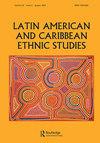阿根廷主流生态农业行动主义中的白人空间政治
IF 1
Q4 ETHNIC STUDIES
引用次数: 0
摘要
本文讨论了支撑阿根廷主流农业生态行动主义的环境想象中的白色。它考察了国家建立时期的知识分子领袖和致力于定义适当的人地关系的当代农业生态学倡导者所阐述的种族和自然的文化政治。从经验上看,它主要关注的是一个激进组织,该组织一直在重新构想替代阿根廷中部农业中心主导的农产品出口经济。矛盾的是,新的领土配置,以规范农药从抗除草剂(HR)大豆田漂移,使新鲜蔬菜生产者在环境保护区域之外。我认为,主流农业生态学倡导者忽视了不属于主流民族-种族身份的农场工人的毒性暴露,从而认可了食品生产中的双重标准。这篇文章表明,有必要更深入地关注种族化实践在社会环境变化的进步议程中通过“适当的环境关系”思想发挥作用的方式。本文章由计算机程序翻译,如有差异,请以英文原文为准。
White spatial politics in mainstream agroecology activism in Argentina
ABSTRACT This paper addresses whiteness in environmental imaginaries underpinning mainstream agroecology activism in Argentina. It examines the cultural politics of race and nature articulated by intellectual leaders during the period of nation-making, and by contemporary agroecology advocates who are preoccupied to define appropriate human-land relations. Empirically, it mostly focuses on an activist organization that has been reimagining alternatives to the dominant agro-export economy in an agricultural hub in central Argentina. Paradoxically, new territorial configurations to regulate pesticide drift from herbicide resistant (HR) soy fields leave fresh vegetable producers outside environmental protection zones. I argue that by neglecting the exposure to toxicity of farmworkers who fall outside dominant ethno-racial identifications, mainstream agroecology advocates endorse a double standard in food production. The article suggests that there is a need for deeper attention to the ways in which the practices of racialization work in and through ideas of ‘proper environmental relations’ in progressive agendas for socio-environmental change.
求助全文
通过发布文献求助,成功后即可免费获取论文全文。
去求助
来源期刊

Latin American and Caribbean Ethnic Studies
Social Sciences-Cultural Studies
CiteScore
1.30
自引率
16.70%
发文量
22
 求助内容:
求助内容: 应助结果提醒方式:
应助结果提醒方式:


